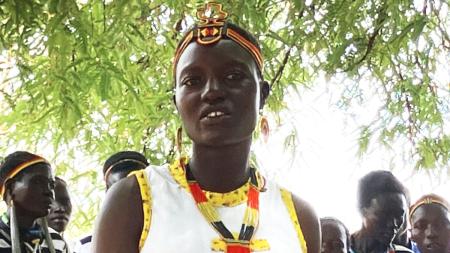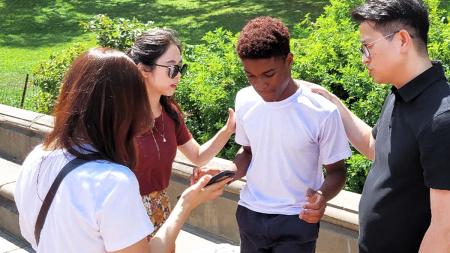Seeking Biblical Justice

Rev. C.B. Samuel
Chris Meehan
Rev. C.B. Samuel is an itinerant Bible teacher from India who travels the world preaching about how members of the Christian church too frequently ignore the justice of God.
He was recently one of the keynote speakers at World Renew’s Assembly of World Partners, which was held at a conference center in Muskegon, Mich.
“The church should not just put its energy into worship,” Samuel told those attending the assembly. “The church must also speak truth to power.”
More than 200 people from around the world — those who work for World Renew as well World Renew partners — attended the week-long assembly at a missionary and Bible conference center in Muskegon, Mich.
Since one of World Renew’s agenda items and goals for the next few years is to focus on justice, Samuel was asked to speak on that topic.
“When we are talking about justice, we are not talking about something that is incidental to God,” he said. “It is about the character of God, the holy God who wants us to engage the world.”
Several other speakers made presentations on such topics as social transformation, spiritual warfare, spiritual leadership, sustainable development, and gender justice. There also were several times of worship and a series of breakout sessions and workshops.
In his talk, Samuel touched on forms of injustice that are at work in his country of India — a country of many Hindu gods, none of which have the same heart for justice as the single God of Christianity, he said.
“In India, in Delhi where I live, people go to the hospital, but they cannot get access to health care because they have no insurance,” he said.
Also, in India, the old are excluded, and even left to die because they are no longer seen as having value to society, said Samuel. It is also in India where incidents of rape of women have drawn international media attention.
“We come across as a society in which there is no justice. We blame the girl, saying it is the woman’s fault because she was out at night in the wrong clothing,” he said.
Injustice is rampant around the world as well, as seen in wars in the Middle East causing the displacement of millions of refugees; economic exploitation of workers in many countries, and the rampant disregard for the environment, he said.
The church needs to more actively engage these issues, realizing that “we have a God who is obsessed with justice. We have a God who gets angry at injustice.”
Samuel based his message on Zechariah 8, in which God promises to return to Jerusalem and it will be a time of justice in which “Jerusalem will be called the City of Truth, and the mountain of the Lord Almighty will be called the Holy Mountain,” Samuel read.
Zechariah and other scriptures speak of a God “who doesn’t sit on a chair with us falling at his feet talking about how great he is. God is a God who wants us to seek his righteous justice,” said Samuel.
“Justice is not a program. We owe it to God and to the world to be true to the Bible and God’s call for justice.”
After Samuel spoke, Esther Kuhn, who works for World Renew in Senegal, said she appreciated the biblical focus on injustice.
“We can tend to think about those parts of the Bible that remind us of what we should be grateful about and not about the need for justice,” she said.
In Senegal, many of the churches are not focused on justice and instead tend to be turned inward toward helping their own members and not addressing “the structural issue of injustice,” she said.
Sadoc Aquilar, who works for World Renew in Guatemala, said he also appreciated the talk. But he said that speaking truth to justice is not always easy to do in Guatemala, a country that was the scene of long and bloody civil war.
“There are wounds that need to be healed yet and people struggle with the issue of impunity — of not being punished for things that might have happened in the past,” he said.
World Renew, however, is working in several ways in Guatemala to seek justice for the people, organizing for their voices to be heard, he said.
“The church has been working slowly for justice there since the end of the war,” he said. “We need churches to talk about justice in such areas as agriculture and preventive health and not just on saving souls.”


